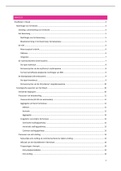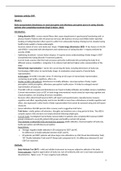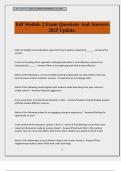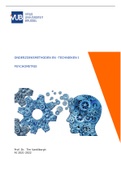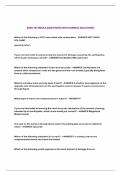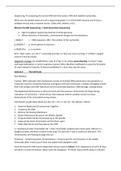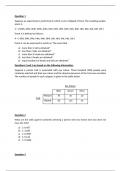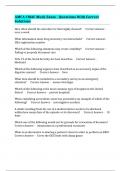Importance of Understanding Delays: Understanding semiconductor supply chain delays is vital for
making informed trade-offs and improving supply chain performance effectively. This paper aims to
contribute to enhancing this understanding.
(2010) Sterman – Business dynamics
chapter 21 – Truth and beauty, validation
and model testing
A good model is one that is suitable for its intended purpose, not necessarily one that is "right." As a
modeler, you can trust results by testing assumptions, ensuring robustness, and documenting work
for replication. As a model consumer, accept a model for action when it aligns with the purpose and
has been thoroughly tested. Questions to ask include those about model assumptions, historical fit,
and sensitivity to different scenarios. Standards should be based on the model's usefulness for
decision-making, with clients and modelers deciding together.
§21.1 Validation and Verification are Impossible
Models are representations useful for guiding further study but not susceptible to proof.
The impossibility of validation and verification extends to all theories relying on imperfectly
measured data, abstractions, and simplifications. Karl Popper's philosophy of refutationism argues
that theories must be subject to refutation to be scientific. Models are most useful when used to
challenge existing formulations rather than to validate them. Model testing should focus on
revealing limitations to improve decision-making. The goal of modeling is to build shared
understanding and solve important problems through communication and persuasion. Model
evaluation is subjective and social, requiring judgment based on individual criteria. Good modelers
focus on the limitations of models to improve them and prevent misuse
§21.2 Questions Modelers Should Ask, but usually don't
In debates over models, philosophical considerations are often overlooked for more practical
reasons. Meadows and Robinson (1985) reviewed nine models focusing on economic development,
resources, and the environment, highlighting issues like mismatches of methods with purposes,
sloppy documentation, and absurd assumptions. The business model record is equally disappointing.
To address these issues, Table 21-1 provides questions that modelers and users should ask to assess
a model's suitability, conformity to fundamental principles, sensitivity to assumptions, and integrity
of the modeling process.
§21.3 Pragmatics and Politics of Model Use
21.3.1 Types of Data
Forrester (1980) identifies three types of data needed for modeling: numerical, written, and mental
data. Numerical data consist of time series and cross-sectional records, while written data include
operational records and archival materials.
Mental data encompass people's impressions, stories, and understanding of systems, crucial for
modeling complex systems. Soft variables lack numerical metrics but are essential, such as
perceptions and expectations. Some modelers prioritize hard data over soft data, but both can be
biased and unreliable. Proper statistical methods are crucial for estimating parameters accurately
and replicating historical data. Sensitivity analysis is necessary to test the robustness of model
conclusions to uncertainty in assumptions. Quantifying soft variables like customer perceptions and
employee morale can provide valuable insights. Modelers must make judgments on the cost and
effort of gathering additional data. Balancing numerical precision with qualitative insights is essential
for accurate modeling and decision-making.
making informed trade-offs and improving supply chain performance effectively. This paper aims to
contribute to enhancing this understanding.
(2010) Sterman – Business dynamics
chapter 21 – Truth and beauty, validation
and model testing
A good model is one that is suitable for its intended purpose, not necessarily one that is "right." As a
modeler, you can trust results by testing assumptions, ensuring robustness, and documenting work
for replication. As a model consumer, accept a model for action when it aligns with the purpose and
has been thoroughly tested. Questions to ask include those about model assumptions, historical fit,
and sensitivity to different scenarios. Standards should be based on the model's usefulness for
decision-making, with clients and modelers deciding together.
§21.1 Validation and Verification are Impossible
Models are representations useful for guiding further study but not susceptible to proof.
The impossibility of validation and verification extends to all theories relying on imperfectly
measured data, abstractions, and simplifications. Karl Popper's philosophy of refutationism argues
that theories must be subject to refutation to be scientific. Models are most useful when used to
challenge existing formulations rather than to validate them. Model testing should focus on
revealing limitations to improve decision-making. The goal of modeling is to build shared
understanding and solve important problems through communication and persuasion. Model
evaluation is subjective and social, requiring judgment based on individual criteria. Good modelers
focus on the limitations of models to improve them and prevent misuse
§21.2 Questions Modelers Should Ask, but usually don't
In debates over models, philosophical considerations are often overlooked for more practical
reasons. Meadows and Robinson (1985) reviewed nine models focusing on economic development,
resources, and the environment, highlighting issues like mismatches of methods with purposes,
sloppy documentation, and absurd assumptions. The business model record is equally disappointing.
To address these issues, Table 21-1 provides questions that modelers and users should ask to assess
a model's suitability, conformity to fundamental principles, sensitivity to assumptions, and integrity
of the modeling process.
§21.3 Pragmatics and Politics of Model Use
21.3.1 Types of Data
Forrester (1980) identifies three types of data needed for modeling: numerical, written, and mental
data. Numerical data consist of time series and cross-sectional records, while written data include
operational records and archival materials.
Mental data encompass people's impressions, stories, and understanding of systems, crucial for
modeling complex systems. Soft variables lack numerical metrics but are essential, such as
perceptions and expectations. Some modelers prioritize hard data over soft data, but both can be
biased and unreliable. Proper statistical methods are crucial for estimating parameters accurately
and replicating historical data. Sensitivity analysis is necessary to test the robustness of model
conclusions to uncertainty in assumptions. Quantifying soft variables like customer perceptions and
employee morale can provide valuable insights. Modelers must make judgments on the cost and
effort of gathering additional data. Balancing numerical precision with qualitative insights is essential
for accurate modeling and decision-making.

